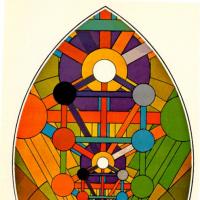Contribuții/Mesaje: 116
Limbă: English
NJ Esperantist (Arată profil) 17 aprilie 2011, 11:20:25
sudanglo:A very valuable exercise, (translation of the 59 instructions). I hope we will all put our heads together on this one.Sudanglo,
Just to kick off - do we prefer aŭtovojo or aŭtoŝoseo, and what about liva instead of the traditional maldekstra?
I find 'koridoro' for lane quite satisfactory.
For you have reached your destination maybe 'vi alvenis' rather than 'vi atingis vian celon'.
For 'bear left' I like 'ĝiru maldekstren'
For 'exit' as a verb 'forlasu'.
For 'take' we could say 'prenu'. But we could also use 'dekstren' and 'maldekstren' as commands
'Trafikcirklo' is fine for roundabout, but one could also consider 'rondirejo'.
Make a U-turn could be 'iru returne'
'At the end of the road' - 'ĉe la fino de la strato'
I am not keen on 'antaŭe' for 'ahead'. Could we do something with 'tuj' or 'venas' or 'proksima'
I'll probably miss addressing one of your points, but...
I chose 'liven' over 'maldekstren' for a few reasons. The Esperanto voice I have now uses 'maldekstren' and my ear while driving only hears the 'dekstren'. 'Liven', I believe was created specifically for use in direction giving in vehicles.
I'm trying to keep the language on the simpler side so that even inexperienced users would understand the directions.
If it's appropriate, I'd prefer 'rondirejo' because it's easier to pronounce.

'antauxe' was the best I could think of. 'tuj venas' pretty good. (I like the word 'tuj')
sudanglo (Arată profil) 17 aprilie 2011, 12:00:17
I think it may facilitate comprehension used in noisy conditions, or be useful when speed of response is of the essence.
So just as pilots use 'niner' instead of nine to make sure it doesn't get mixed up with 'five', so a similar case could be made here for using 'liva'.
However, from my experience it is extremely rare in ordinary conversation among the 'samideanaro'.
Since there are many contexts in which Esperanto is infrequently used (shopping in a supermarket, or rescue situations with the fire brigade, or in a court of law, for example) then I think that we may consider Esperanto as still in a state of active development, and special uses are still not fixed.
erinja (Arată profil) 17 aprilie 2011, 12:18:44
I have known some Italians to say "ĝiri" to mean "to turn", but it's a mistake. Ĝiri sounds like girare (to turn) in Italian, so it's a false friend for Italians. I'm sure that this gir combination makes some people think it's a cognate with the Greek root γυρ/ (gyr/), like gyroscope, so it could be a false friend for some non-Italians as well.
But the Esperanto word ĝiri has nothing to do with turning; it has two meanings, and they both deal with financial transactions involving handing money over to someone else.
[1] to endorse, as in endorsing a cheque (to sign the back of a financial document to hand over its value to someone else)
[2] to transfer a sum of money from one financial account to another.
So "Mi ĝiris al li la monon por la aŭto" [I wire transferred money for the car to him]
It doesn't make sense to talk about financial transactions when driving around, I think! The correct word for "to turn" is turni (transitive) or "turniĝi" (intransitive)
NJ Esperantist (Arată profil) 17 aprilie 2011, 18:59:28
erinja:Please don't use "ĝiru" for "turn"; ĝiri doesn't mean 'to turn'.I am so glad to hear you address 'ĝiri'. The speaker in the Esperanto voice I put on the GPS uses 'ĝiri' and it unnerves me. To find 'ĝiri' in the meaning of 'turn a car or vehicle' you have to look in the Esperanto to Englsh section of the new Wells dictionary. It's sandwiched in between the other two meanings. FWIW Esperanto speaker on my GPS also says 'pruntepreni' for 'take, as in 'take the exit'.
I have known some Italians to say "ĝiri" to mean "to turn", but it's a mistake. Ĝiri sounds like girare (to turn) in Italian, so it's a false friend for Italians. I'm sure that this gir combination makes some people think it's a cognate with the Greek root γυρ/ (gyr/), like gyroscope, so it could be a false friend for some non-Italians as well.
But the Esperanto word ĝiri has nothing to do with turning; it has two meanings, and they both deal with financial transactions involving handing money over to someone else.
[1] to endorse, as in endorsing a cheque (to sign the back of a financial document to hand over its value to someone else)
[2] to transfer a sum of money from one financial account to another.
So "Mi ĝiris al li la monon por la aŭto" [I wire transferred money for the car to him]
It doesn't make sense to talk about financial transactions when driving around, I think! The correct word for "to turn" is turni (transitive) or "turniĝi" (intransitive)
tommjames (Arată profil) 17 aprilie 2011, 19:36:52
NJ Esperantist:To find 'ĝiri' in the meaning of 'turn a car or vehicle' you have to look in the Esperanto to Englsh section of the new Wells dictionary. It's sandwiched in between the other two meanings.Wells isn't the only one, it's also in NPIV (2002) and Benson. But I've never used that verb before so I won't chime in on it's suitability.
NJ Esperantist (Arată profil) 18 aprilie 2011, 00:20:46
tommjames:My point was that it's not in the English to Esperanto section; you won't find 'ĝiri' under the entry for 'turn'. It's only in the Esperanto to English section. It doesn't have a frownie, but it doesn't see to be outwardly approved of either.NJ Esperantist:To find 'ĝiri' in the meaning of 'turn a car or vehicle' you have to look in the Esperanto to English section of the new Wells dictionary. It's sandwiched in between the other two meanings.Wells isn't the only one, it's also in NPIV (2002) and Benson. But I've never used that verb before so I won't chime in on it's suitability.
henma (Arată profil) 18 aprilie 2011, 00:53:45
Mike:Wait...For 'bear left' I like 'ĝiru maldekstren'Boooo! I'm a strong advocate of "liva" rather than "maldekstra". Three syllables for a basic word that expresses a direction is at least two syllables too many (Yes, I know "dekstra" is two syllables, but it's a century too late to have a talk with Zamenhof about that).
I may agree with the fact that, in certain conditions, maldekstra can be misunderstood.
Usually I would prefer to keep Esperanto with a minimal set of roots, in order to keep it as simple to learn for everybody as possible. But I agree with this special case of giving directions and avoid confusion.
BUT... I don't agree with "Three syllables for a basic word that expresses a direction is at least two syllables too many"...
My native language is Spanish, and BOTH words for directions have THREE syllables for us (iz-quier-da: left, de-re-cha: right)... We have survived with that for centuries, and I don't think that has been any problem.
Just keep in mind that other languages don't have to share the same characteristics than yours to be good. The fact that English have monosyllabic words for directions doesn't mean that it's the best for an international language.
Just my two cents.
Regards,
Daniel.
ceigered (Arată profil) 18 aprilie 2011, 05:33:23
 ).
).That said, "liva" is the best we've got as an alternative to "maldekstra", and introducing a new root might be dangerous.
I find it funny though that there's so many ways to say left, but all the ways to say right in many western european languages are related - e.g.:
- The Germanic English "right" (r-kh-t)
- The Latin Spanish and French "derecha" and "droit" (d-r-k-t)
But then, we have "left", and what happens?
- English "left" (from the root "lopped off, the remainder, the weak bit")
- German/Dutch "link(s)"
- Swedish "vänster"
- French "gauche" (à gauche?) (from "to warp/distort")
- Spanish "izquierda" (from the Basque "ezker"
- Latin/Italian/Anglo-Norman "sinister/sinistra/senestre" (from "improper, adverse, bad")
And "liva" seems to be slavic in origin, but what the original meaning of "levij/lewy/lev" etc was seems hard to find. (If the Slavic languages, like English, made intermedial Proto-Indoeuropean "b/bh" sounds into "f/v"s, maybe "left" and "liva" ultimately come from the same root).
3rdblade (Arată profil) 18 aprilie 2011, 06:37:08
Mike:What's current usage like on this one nowadays? If I used "liva" in casual conversation with a samideano, would they look at me funny, or just take it in stride?In my limited exposure among the Esperantistos here in Japan, I've never heard it, and the only time I've seen it written is in discussions about 'maldekstra' and how it seems too close to 'dekstra' to some learners. I've never had a problemo with differentiating the two words, but then again, I get my lefts and rights mixed up now and then. The words 'left' and 'right' aren't 'automatic', like a red light is. So for example if we are driving and I see a red light, I'll hit the brakes automatically, but if you suddenly told me to turn left, I might just go right! What an annoying quirk... Anyway I think hearing the GPS lady say in her slow soft robot voice 'turnu...mal-dekstre...post...300 metroj' would be pretty clear.
Just remember, when I write the Great Esperanto Novel, there will be no "maldekstra" to be found within it.Any reason? It's not a metaphorical tale about a guy who thinks what is right is always to turn right and never to turn left, and thus he always goes in circles and ends up where he began, is it? Proving that "You can't be right all the time", "Sometimes one must travel the path that is not right"...

Kirilo81 (Arată profil) 18 aprilie 2011, 08:31:50
ceigered:It's common to distinguish between the "good" hand (right) and the "bad" hand (left), because before there was toilet paper you used the left one to clean your back.
I find it funny though that there's so many ways to say left, but all the ways to say right in many western european languages are related - e.g.:
- The Germanic English "right" (r-kh-t)
- The Latin Spanish and French "derecha" and "droit" (d-r-k-t)
But then, we have "left", and what happens?
- English "left" (from the root "lopped off, the remainder, the weak bit")
- German/Dutch "link(s)"
- Swedish "vänster"
- French "gauche" (à gauche?) (from "to warp/distort")
- Spanish "izquierda" (from the Basque "ezker"
- Latin/Italian/Anglo-Norman "sinister/sinistra/senestre" (from "improper, adverse, bad")
And "liva" seems to be slavic in origin, but what the original meaning of "levij/lewy/lev" etc was seems hard to find. (If the Slavic languages, like English, made intermedial Proto-Indoeuropean "b/bh" sounds into "f/v"s, maybe "left" and "liva" ultimately come from the same root).
For tabuistic reasons the word for "left" is often changed or replaced, often with euphemistic words.
On the other side there is often a conflation of the compass directions and left/right, depending whether your main direction is east, north or south, e.g. Luvian ipala- 'left' is related to ipaman- 'west' and the root *yebh- 'to enter'.
Going back to the Indo-European words, Latin dexter and Greek deksíteros go back to *dek'- 'take', so the right hand is "the acceptable one". For "left" there seem to be traces of a very old word *sewyo-, but more often a *sk'eh2iwo- (Lat. scaeuus, Gr. skaiós) and *leh2iwo- (Lat. laeuus, Polish lewy), literally "the one in the shadow (Gr. skiá) and "the hidden one" (*leh2- 'hide', no relation with left!).
The words for "right" you cited ultimatively go back to the root *h3reg'- 'straighten, reach out' (Lat. rex 'king' as the one who gives the direction).







